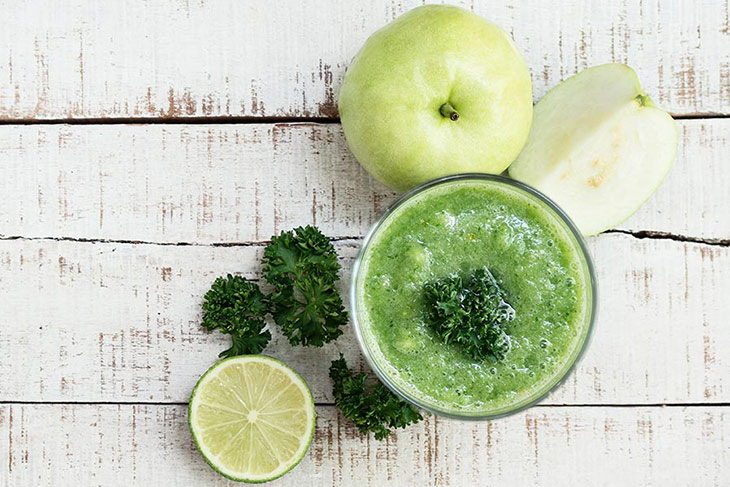Why you don’t need to detox

Concerns are growing about the popularity of so-called “detox” diets that claim to cleanse, purify and detoxify your organs, helping to promote general health and weight loss. But what is a detox diet - and should you try one?
What is a detox?
There are various detox methods available. Some detox plans recommend herbs, pills, powders, enemas and other forms of colon cleansing. Many products use a combination of fruit and vegetable extracts, liver tonics and laxatives.
Juice cleanses, one of the most popular types of detox methods, are often made with juiced fruits, vegetables and herbs. In many cases, detox products limit key food groups, such as meat and dairy, while others recommend fasting, calorie restriction or eliminating food for a period of time.
Also read: 5:2 diet versus the Total Wellbeing Diet
A common factor among all detox methods is that they promise a kind of cleansing benefit for the liver or kidneys, as they play a vital role in eliminating wastes and toxins from the body. But do they work?
A central theme of many detox diets is that in order to cleanse your body, you need to restrict or pay particular attention to certain food groups. CSIRO Research Dietitian Dr Jane Bowen rejects the idea.
“Radically restrictive “detox” regimens are very unlikely to achieve the outcome you are hoping for. So you will probably have a fairly unpleasant dieting experience for very little gain,” she says.
The scientific evidence
The idea that we need a detox product to achieve overall health and aid weight loss is not supported by medical science. Healthy adults have a wonderful system for removal of waste products and toxins from the body. Our lungs, kidneys, liver, gastrointestinal tract and immune system are all primed to remove or neutralise toxic substances from the body.
Currently, very few scientific studies have investigated the effectiveness of detox diets for losing weight. According to the Journal of Human Nutrition and Dietetics studies which have shown that some commercial detox diets enhance detoxification in the body are hampered by flawed methodologies and small sample sizes.
Detox cleansing methods can also have adverse effects. Colon cleansing, for instance, can cause dehydration, cramping and bloating. Also, data supporting colonic “detoxification” have not been studied well, according to The American Journal of Gastroenterology. Over time, long term fasting or severe calorie restriction can result in energy, vitamin and mineral deficiencies, fatigue and irritability. Not to mention bad breath.
One of the major problems with juice detoxing is the lack of protein and healthy fats people miss out on. For instance, protein is a vital nutrient needed on a daily basis. When it is not provided, your body will source it from muscle tissue, which can lead to loss of muscle mass.
Just like protein, fats are an important nutrient for your body to function and perform at its best. It forms the basis of cell membranes, allowing them to function correctly, protect and nourish our internal organs, support healthy brain development and heart health, and help absorb fat-soluble vitamins. While cutting out fat may seem like an effective way to lose weight, it’s actually depriving your body of a vital macronutrient your body needs to function at its best.
The key is to choose healthy fat sources such as nuts, avocados and salmon that protect your heart and support your overall health, and avoid saturated fats in chips, cookies and greasy foods that can increase your risk for certain diseases.
The CSIRO Total Wellbeing Diet healthy eating plan
Perhaps the ultimate way to ‘detox’ is creating incremental and lasting changes towards a healthier eating pattern that you can enjoy for life, Dr Bowen suggests.
“Alcohol, many processed foods and sugary drinks add empty calories – that is energy but not beneficial nutrients – so cutting back on those is a good start. It’s helpful to think about what they can be replaced with, so the feeling of deprivation doesn’t undermine your commitment to healthier eating. Think fresh vegetables, fruit, lean meats, low fat dairy foods, whole grains and nuts.”
Unlike detox diets, the Total Wellbeing Diet approaches weight loss in a sustainable and realistic way. By choosing to eat healthy foods from all the major food groups - vegetables, fruits, whole grains, lean protein and dairy – you’re more likely to succeed long term. Protein in particular, a key nutrition often left out on detox diets, is key to balancing blood sugar and insulin and cutting cravings to prevent unwanted weight gain.
In short, the human body comes with all the detox functionality it needs already built in. A better approach to 'detoxifying' your body is eating a well-balanced and sustainable diet.
